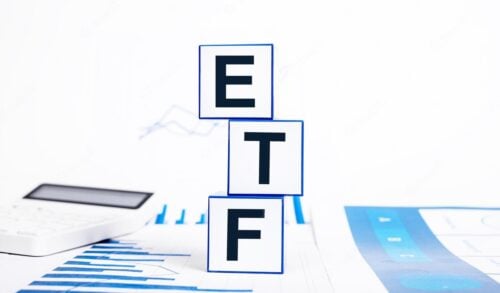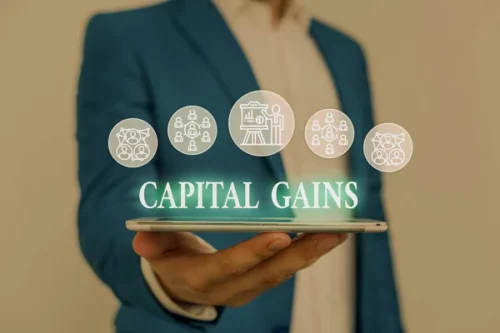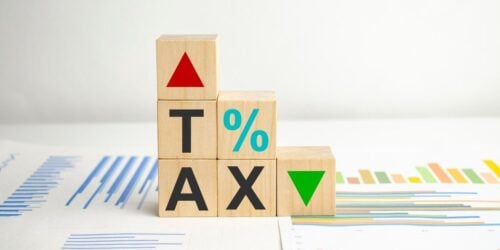Investors are looking for ways to reduce their capital gains taxes while still getting solid returns.
That said, many wonder do ETFs pay capital gains?
In this article, we explore the answer, and more.
About ETFs
Exchange Traded Funds (ETFs) are a type of pooled investment security.
They form a bouquet of stocks for investors to trade in rather than individual shares. In this sense, they are much like mutual funds.
Moreover, both of them charge a fee for managing a portfolio of stocks that mimics the returns of their underlying index.
This is known as an expense ratio, and it is usually lower for ETFs.

Since most of them are passively managed and track specific indexes, their expenses are relatively lower.
ETF securities are also best known for giving investors a cost-effective and tax-efficient tool for diversification.
But how do they mitigate taxes, and why are their capital gains so low?
We answer these questions in the article below.
Do ETFs Pay Capital Gains?
Yes, ETFs must distribute capital gains (if any) at least once a year to their shareholders.
However, the quantum generated is much lower than comparable financial instruments like mutual funds.
To understand this, let’s first see how capital gains happen.
In the case of pooled securities like ETFs or mutual funds, they occur when there is a profit from buying or selling underlying securities.
Typically, this is done for two reasons: re-balancing a portfolio or redeeming shares to investors.
The former is needed periodically to ensure that the fund’s returns align with its investment strategy.
In the latter case, whenever a unit holder sells their shares in the fund, it might have to sell underlying stock to redeem them.
However, ETFs generate very few capital gains in either of these cases.
There are three reasons for this:
- Passive nature
- Unique rebalancing process
- ETFs are traded on stock markets
In the below section, we explain these three points further.
Why Do ETFs Have Lower Capital Gains?
Passive nature
Most exchange-traded funds are passively managed.
They only need to rebalance their portfolio as and when the underlying index changes its composition.

In comparison, actively managed mutual funds must keep shuffling their holdings to meet their investment objectives.
This means fewer trades and hence lower capital gains for ETFs.
Traded on Stock Exchanges
Unlike mutual funds, unit holders do not buy and sell ETF securities from their originators.
Instead, they simply trade the shares on stock exchanges.
Therefore, the firm that has created the fund does not need to raise cash to redeem investors each time units are sold.
Unique rebalancing process
Finally, ETFs don’t need to buy and sell shares in order to re-align their portfolio assets.
They employ a unique “in kind” process, which avoids capital gains.
We explain how it works below.
When buying
Each time they need to buy more stocks for their portfolio, ETFs produce “creation units.”
These are nothing but the ETF stock itself.
They are offered to authorized participants (APs) in exchange for arranging portfolio securities.
Since there is no money exchanged in the transaction, there are no capital gains.
While selling
When they need to sell securities, the reverse process is followed.
The funds let APs redeem creation units and give them the underlying shares in return.
Hence, again, capital gains are avoided.
Due to this unique process, ETFs are more tax efficient than even index mutual funds, which are also passive.
Do You Pay Taxes on ETF if You Don’t Sell?
Yes, on rare occasions, investors might have to pay taxes on ETFs.
Even though they are very efficient at avoiding gains, there might be some exceptional situations that cause such profits to occur.
Whenever these ETF capital gains distributions happen, they end up causing stockholders to pay taxes.
This is true even if they have not profited from selling the fund’s shares.

Some surprising scenarios can arise due to this.
For example, an ETF holder might have to pay capital gains despite having (notionally) lost money on it.
This is because the fund can still create capital gains from the above transactions, which get passed on to the investors.
Moreover, folks might have to pay tax on this money, even though they purchased the fund units only a few days back.
Do You Pay Tax on ETF Profits?
Yes, any profits from the sale of ETF units are taxable.
If the securities were held for more than a year before selling, long-term capital gains tax is applied.
This can be as much as 20% (+ an additional 3.8%, depending on the modified adjusted gross income)
For holding periods than one year, ordinary income tax is applied instead.
This can reach as much as 40.8%
How Do ETFs Avoid Capital Gains?
Apart from generating fewer taxable events, some believe that ETFs also let investors skirt the wash-sale rule.
This is used for tax loss harvesting and helps reduce capital gains taxes.
Let’s first explain what this term means.
Any transaction where a security (or a “substantially similar” one) is sold and bought back within 30 days is known as a wash-sale.
The same investor buying options or other contracts of the asset within this period is also classified under such deals.
Even if the trader’s spouse or a firm controlled by them buys back the stock, it would also constitute a wash-sale.
Now, you might wonder about the point of carrying out such a trade.
It helps to create a loss on the books for tax deduction purposes while letting the investor continue to maintain their position.
For stocks, the IRS does not allow traders to claim a tax break in such cases.
However, the rule is difficult to enforce when dealing with ETFs.
Large indexes often have multiple funds tracking them.
For example, the SPDR S&P 500 ETF (SPY), the Vanguard S&P 500 ETF (VOO), and the iShares Core S&P 500 ETF (IVV) all track the same benchmark index.
It is possible to sell one of these at a loss and then buy another one immediately without violating the IRS rule.
Financial professionals use this technique to bring down capital gains taxes for their clients.
Taxes on ETFs vs Mutual Funds
ETFs can be significantly more tax efficient than mutual funds, as discussed before.
Below, we compare the two to help you understand why this is the case.
Fewer Taxable Events
When mutual funds re-balance their underlying assets, they do so by actually buying and selling them.
Such “taxable events” can incur capital gains, which get passed on to unit holders.

ETFs follow a unique creation and redemption process, where actual trades are avoided (as explained earlier).
To their credit, the mutual fund industry tries to mitigate this drawback through tax loss harvesting and other strategies.
Still, there is a big difference in overall capital gains distributions between them.
Passively Managed
Since most ETFs merely track indexes, they have to carry out fewer rebalancing transactions anyway.
Most mutual funds are actively managed and have defined investment objectives.
They need to keep trading their portfolio securities to align with their strategy.
Exchange-Traded Notes (ETNs)
Notes are the most tax-efficient structure of ETFs.
They do not have any underlying shares. Instead, they hold index-linked fixed-income investments guaranteed by banks.
Hence, there is no need for them to pay any dividends (which are taxable).
The money just keeps getting added to the funds’ returns without being paid out.
Taxation happens only when the shareholder sells the stock.
A Few Exceptions
Many international ETFs that track emerging economies are prohibited from in-kind redemption and creation.
This lowers their tax efficiency.
Again, leveraged, inverse, and inverse leveraged ETFs work very differently from traditional ones (even though they share the name).
These funds use derivatives to amplify (or reverse) the returns of the index.
The underlying financial assets used cannot be traded in kind, unlike normal stocks.
Hence, the funds are less tax efficient than equity-based ones.
Commodity ETFs also have the same drawback because they cannot be traded “in kind.”
Are ETFs a Good Investment?
ETFs have several advantages, such as diversification, tax benefits, and cost-effectiveness.
However, their returns are lower than direct investments in equities or actively managed mutual funds.
![]()
Like other financial instruments, there is a lot for traders to consider before investing in them.
We cover some of the key points below.
Pros of ETFs
Diversification
These funds provide a bouquet of stocks (usually based on a particular index) in one place.
Traders can get a diversified portfolio through them without making an effort to build it on their own.
It saves a lot of time and money for them.
Liquidity
Exchange-traded funds are bought and sold on the stock market. Their unit price changes throughout the day.
This makes them very liquid.
In contrast, other pooled securities, such as mutual funds, can only be purchased from their creators.
Moreover, their net asset value can change at most once a day.
Cost Effectiveness
Most ETFs are passively managed, as mentioned before. They have fewer rebalancing requirements.
Their expense ratios are also lower due to this reason.
In contrast, actively managed funds often carry higher expenses, management fees, sales loads, and so on.
Tax Efficient
We shared above how these funds shield their shareholders from a higher tax burden.
Cons of ETFs
Lower Returns
Index tracking is a low-risk strategy.
It is unlikely to generate the kind of returns individual stocks can offer.
Expensive as Compared To Holding Stocks
While ETF expense ratios are low, it is an ongoing cost levied on the shareholder.
In contrast, it is possible to buy and sell securities at zero commissions, and they do not have any expense ratios.
Lower Dividend Yields
These funds are not optimized for dividends.
For those who are looking for a high and steady income, purchasing a few good dividend stocks might easily outshine taking an ETF.
Leveraged ETFs
Despite the similar name, leveraged ETFs are a whole different ball game.
They use derivative contracts to achieve their investment objectives, which makes them a lot riskier.
Neither can they avoid capital gains, as explained earlier.
From a long-term perspective, holding leveraged ETFs is a bad idea.
In most cases, they will lag the performance of their underlying index when held for longer periods.
Is it OK to Just Invest in ETFs?
Investing only in ETFs may not be a good idea.
They are an excellent option for diversification but still carry some risks.
Moreover, all of them are not equally good products.
If an exchange-traded fund has an inherently volatile underlying asset, it might still be a risky investment.
Again, because they are traded on stock markets, it is hard to make systematic investments in them.
Investors may find it difficult to use them in 410(k) plans that take advantage of dollar cost averaging.
Mutual funds are more amenable to this investment method.
Lastly, returns on ETFs are limited.
It is possible for smart traders to build a strong portfolio of equities or buy actively managed mutual funds.
This way, they can benefit from diversification while also enjoying higher returns.
Final Thoughts
From fewer taxable events to lower capital gains distributions, ETFs are designed to keep the taxman away from your door.
They seldom generate situations that might cause shareholders to have to pay capital gains taxes.
Some even believe these funds can help with tax loss harvesting by avoiding the wash-sale rule.
But, like any other financial instrument, there are pros and cons to buying them.
Their returns are not as stellar as direct investing in stocks.
Moreover, having to pay up an ongoing expense ratio might make them less desirable than holding securities directly.
Prospective investors need to understand these factors before buying, and taxes should not be their only consideration.


 Tags:
Tags:










